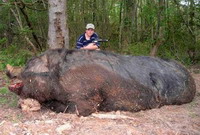New wild giant pig found in Brazil Amazon
Dutch scientist has discovered a new species of wild pig measuring over four feet (1.2 meters), nearly twice the size of other Amazon pigs.

Other experts say that while more research is necessary to confirm the species is new, the find is plausible - and that it adds to arguments for more efforts to preserve the jungle habitat.
The findings, published in the Oct. 29 edition of the German scientific journal Bonner Zoologische Beitrage, follow a string of other new species discovered by Marc van Roosmalen since 1996.
Van Roosmalen's success in discovering new species in the Amazon has earned him international acclaim. In June, it also earned him a 16-year prison sentence for auctioning off naming rights to some of the species to preserve their habitats - a conviction he is appealing.
Van Roosmalen, said he discovered the peccary - a kind of wild pig he dubbed Pecari maximus - by accident in 2000 while searching for a new monkey species.
"I sensed there was something behind me and looked over my should and saw three huge peccaries walking in a row," Roosmalen said in telephone interview from his home in the jungle city of Manaus. "They came and disappeared like ghosts without making any sounds, that was atypical of peccaries who always go around making lots of noise."
Van Roosmalen said local woodsmen confirmed the existence of a giant peccary called "caitetu munde," which means "giant peccary that lives in pairs" in the Tupi Indian language.
Van Roosmalen said the peccary was remarkable for traveling in small groups, usually two adults, sometimes accompanied by one or two offspring, while other peccaries tend to move in large herds.
DNA analysis of three peccaries captured later showed the animal diverged from the most closely related species, Pecari tajacu, or collared peccary, about 1 million to 1.2 million years ago, not long after the Madeira river grew from a small river into a huge, largely impassible barrier that allowed the species to evolve separately, Van Roosmalen said.
Van Roosmalen said the giant peccary's small groups leaves them vulnerable as more humans move into the once-pristine jungle region; they can be hunted with dogs that cannot take on the large herds.
The peccary's large size, as much as 40 kilograms (90 pounds), also makes it attractive to meat-seeking hunters. It's often twice the size of a collared peccary or javelina.
Scientists not involved in the study expressed cautious enthusiasm.
"The possible discovery of a new peccary species is very exciting, and plausible, considering recent discoveries of new mammal species in the Amazon," said Alexine Keuroghlian, a researcher with the Wildlife Conservation Society. "However, based on the information reported in the article ... I believe that further research is necessary."
Keuroghlian questioned the small number of specimens and said some known peccary species exhibit some of the behaviors van Roosmalen describes, though she praised the comparative DNA and skull analyses.
She also agreed with van Roosmalen about the urgency of protecting the study region considering "recent discoveries of new primates.... and possibly a new peccary."
Van Roosmalen said he felt it was important to publish his study quickly to call attention to his scientific work in the wake of his conviction.
Many scientists have denounced his conviction on charges that include keeping animals without a permit at his home and auctioning off the naming rights of new species - a right the court said belongs to the government.
Van Roosmalen was jailed for nearly two months before lawyers won his release on Aug. 7.
Van Roosmalen's lawyers say the charges were trumped up by local logging interests who fear his discoveries may interfere with their efforts to expand into the nearly pristine jungle region between the Madeira and Tapajos rivers.
The region where Roosmalen discovered the new peccary and other species - mostly primates - lies along a logging frontier around Nova Aripuana, where the number of sawmills has grown from two in 2002 to 14 today.
Subscribe to Pravda.Ru Telegram channel, Facebook, RSS!




